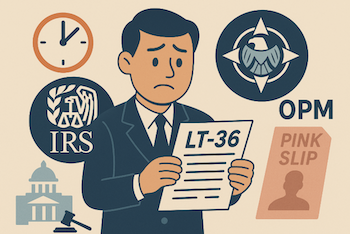Our information is written for federal employees and reviewed by attorneys highly-experienced in federal employment law. We follow strict internal standards to ensure everything we publish is reliable, transparent, and up to date.
- Expert: Justin Schnitzer, Esq. — Lead Attorney & Founder, represented 1,000+ federal cases across EEOC, MSPB, and OPM
- Expert: Gary Poretsky, Esq. — Attorney, Disabled Veterans’ Rights advocate, 17+ years
- Focus: Practical legal guidance for federal employees
- Last updated: August 2025
Mystery LT-36 letters arrive just as OPM proposes a rule to fire staff over unmet tax obligations, prompting attorneys to warn that even minor disputes could become grounds for dismissal.
Washington, D.C., August 11, 2025 — More than half a million current and former federal employees opened their mail last month to find an IRS notice labeled LT-36 declaring, “Urgent: You have an outstanding tax issue.” The agency says about 525,000 government workers and retirees collectively owe back taxes, but the letter lists no dollar amount, no tax year, and no response deadline.
The timing has set off alarms. Just weeks earlier, the Office of Personnel Management proposed a suitability rule that would let agencies dismiss employees within five workdays if they fail to “comply with generally applicable legal obligations, including timely filing of tax returns.”
Employment attorneys note that while IRS privacy laws bar the service from sharing individual data with agencies, the new rule would allow supervisors to demand proof of compliance once they learn a worker received an LT-36.
Federal employment attorney Justin Schnitzer cautioned:
“Unpaid taxes could become the easiest pretext for a politically motivated purge. Even minor disputes under appeal may suddenly look like misconduct under the proposed standards.”
Tax practitioners say the one-page notice has arrived even for employees who already have payment plans in place. The form urges recipients to “lead by example” but offers minimal specifics, prompting some to suspect a scam and others to panic over unspecified liabilities.
Why this matters is clear: if OPM finalizes its fast-track firing rule, an unresolved LT-36 could jeopardize a career that took decades to build. The letter also lands amid broader workforce cuts and restructuring efforts that already have many civil servants on edge. Employees who ignore the notice risk levies or garnishments as well as possible suitability charges once agencies gain the authority to act on tax non-compliance.
Federal workers who receive LT-36 should log into their IRS Online Account or call the number provided to verify any balance, confirm that past-due returns were filed, and set up or reaffirm an installment agreement. Keep a copy of every transcript, receipt and correspondence; OPM’s draft rule places the burden on employees to prove timely compliance. Those with unresolved disputes—such as penalty abatements or audit reconsiderations—should document the pending case and alert their agency’s human-resources office.
Respond quickly, keep meticulous records and, if necessary, consult counsel before the proposed suitability framework becomes final. Doing so may be the difference between resolving a tax glitch and receiving a pink slip.

